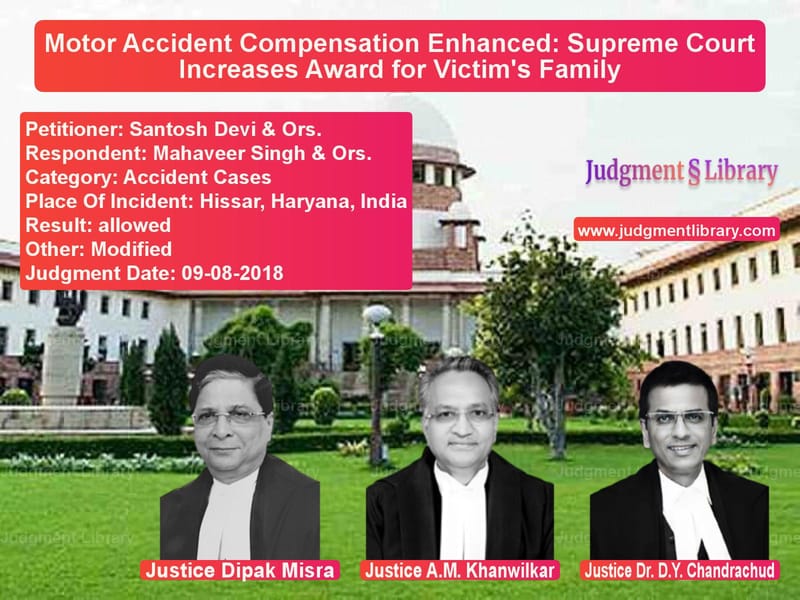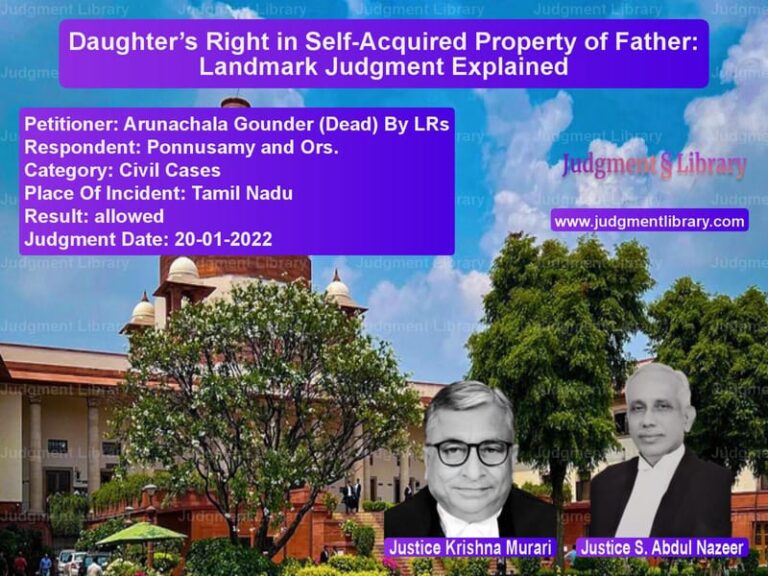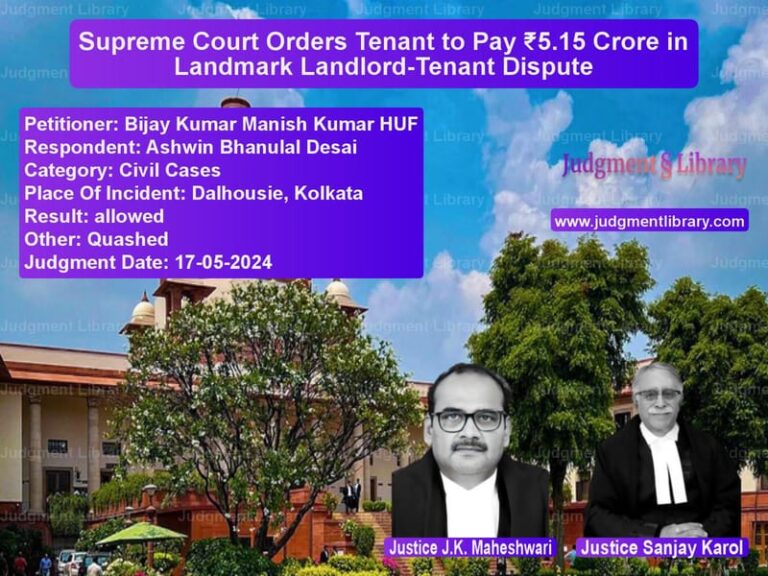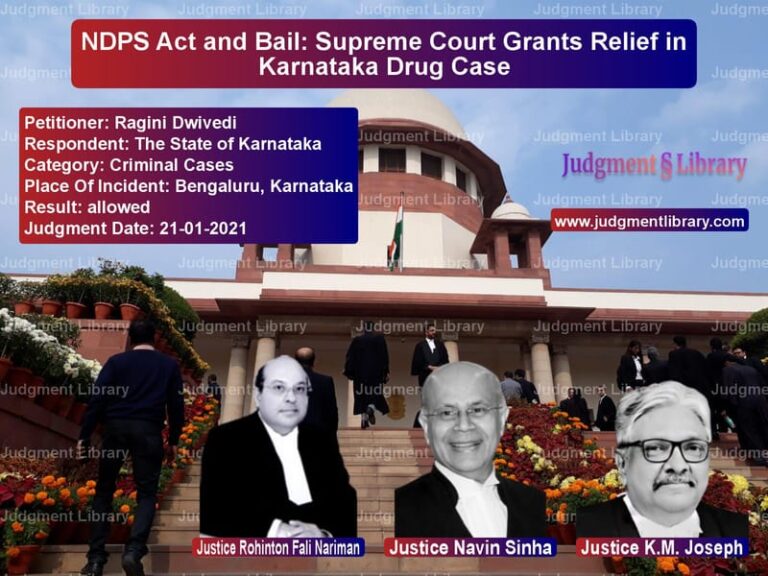Motor Accident Compensation Enhanced: Supreme Court Increases Award for Victim’s Family
The Supreme Court of India, in its judgment dated August 9, 2018, ruled on a motor accident compensation case, significantly increasing the awarded amount for the victim’s family. The case, Santosh Devi & Ors. vs. Mahaveer Singh & Ors., arose from a road accident in which Puran Chand, the deceased, was fatally injured due to the rash and negligent driving of a government Jeep. The apex court reassessed the compensation awarded by the Motor Accident Claims Tribunal (MACT) and the Punjab and Haryana High Court and substantially enhanced it in line with legal precedents.
The ruling reaffirms the judiciary’s commitment to ensuring fair compensation for victims’ families and provides clarity on the assessment of income, application of multipliers, and future prospects in motor accident claims.
Background of the Case
The accident occurred on December 30, 1992, when a government Jeep bearing Registration No. HYH-100 collided with Puran Chand’s moped. Chand sustained grievous injuries and later succumbed to them. His wife and children, the appellants, filed a claim under Section 166 of the Motor Vehicles Act, 1988, seeking compensation of Rs. 10 lakhs.
The MACT found that the Jeep driver was at fault, driving negligently on the wrong side of the road. However, the tribunal assessed Puran Chand’s monthly income at Rs. 1,200, reasoning that he ran a small, unnamed business without tax records. As a result, the tribunal awarded Rs. 1,15,200 using a multiplier of 12, with interest at 15% per annum.
On appeal, the Punjab and Haryana High Court increased the multiplier to 15 and revised the compensation to Rs. 1,85,000 but reduced the interest rate to 8% per annum. Unsatisfied with the revised amount, the family of the deceased moved the Supreme Court.
Petitioner’s Arguments
The appellants, represented by their counsel, argued that:
- The High Court should have applied a multiplier of 16 instead of 15, considering the deceased’s age of 38 years.
- The deduction for personal expenses should have been capped at 10% rather than one-third.
- The deceased’s actual monthly income was Rs. 3,500, of which Rs. 3,000 was spent on household expenses, and the tribunal erred in reducing it to Rs. 1,200.
- The compensation should have been substantially higher, considering future prospects and dependency loss.
Respondent’s Arguments
The respondents, representing the government and the insurer, contended that:
- The assessment of income by the MACT was reasonable since no tax records or official documents were produced.
- The compensation awarded by the High Court was fair and in accordance with judicial precedents.
- The multiplier and deductions applied were legally sound.
Supreme Court’s Observations
The Supreme Court carefully reviewed the records and found that the assessment of income by the MACT was on the lower side. Taking a more realistic approach, it held:
“The income should have been assessed at Rs. 2,500 per month, having due regard to the nature of the business, the date of the accident, and all the circumstances of the case.”
The Court then applied a multiplier of 16, considering the deceased’s age. It also factored in future prospects, adding 40% to the net income, in line with the principles laid down in National Insurance Company Limited vs. Pranay Sethi (2017). Accordingly, the Court recalculated the compensation as follows:
- Monthly income: Rs. 2,500
- Annual income: Rs. 30,000
- Deduction of one-third for personal expenses: Rs. 10,000
- Net annual income: Rs. 20,000
- Future prospects (40% addition): Rs. 8,000
- Total income after future prospects: Rs. 28,000
- Multiplier: 16
- Total compensation for loss of dependency: Rs. 4,48,000
- Addition for conventional heads (as per Pranay Sethi): Rs. 75,000
- Final compensation: Rs. 5,23,000
Final Verdict
The Supreme Court allowed the appeal, stating:
“The appellants would be entitled to interest at the rate of 9% per annum from the date of the petition until payment.”
With this ruling, the Court set a precedent in ensuring just compensation in motor accident cases by accounting for real-life economic considerations, fair assessment of income, and future prospects.
Conclusion
The judgment in Santosh Devi & Ors. vs. Mahaveer Singh & Ors. highlights the importance of realistic income assessment and the necessity of including future prospects when determining compensation in motor accident claims. It underscores the judiciary’s role in balancing legal frameworks with ground realities to deliver fair justice to victims’ families.
Petitioner Name: Santosh Devi & Ors..Respondent Name: Mahaveer Singh & Ors..Judgment By: Justice Dipak Misra, Justice A.M. Khanwilkar, Justice Dr. D.Y. Chandrachud.Place Of Incident: Hissar, Haryana, India.Judgment Date: 09-08-2018.
Don’t miss out on the full details! Download the complete judgment in PDF format below and gain valuable insights instantly!
Download Judgment: Santosh Devi & Ors. vs Mahaveer Singh & Ors Supreme Court of India Judgment Dated 09-08-2018.pdf
Direct Downlaod Judgment: Direct downlaod this Judgment
See all petitions in Compensation Disputes
See all petitions in Motor Vehicle Act
See all petitions in Negligence Claims
See all petitions in Judgment by Dipak Misra
See all petitions in Judgment by A M Khanwilkar
See all petitions in Judgment by Dhananjaya Y Chandrachud
See all petitions in allowed
See all petitions in Modified
See all petitions in supreme court of India judgments August 2018
See all petitions in 2018 judgments
See all posts in Accident Cases Category
See all allowed petitions in Accident Cases Category
See all Dismissed petitions in Accident Cases Category
See all partially allowed petitions in Accident Cases Category






